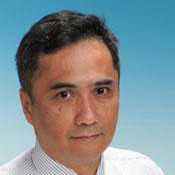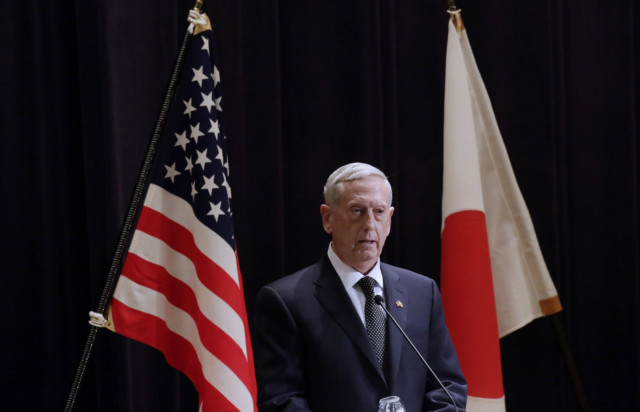U.S. Defense Secretary James Mattis has reaffirmed Washington’s commitment to its defense treaty with Tokyo, amid concerns about President Trump’s approach to the region and the alliance. He claimed the Diaoyu Islands or Senkaku Islands Known to Japanese, are covered by the military accord. In his first overseas trip as the Pentagon chief, Mattis also played down the need for major military moves by the US in the South China Sea.
CGTN’s Terrence Terashima reports.

U.S. Defense Secretary James Mattis is Trump’s first cabinet member to visit Japan and arguably one of the most important figures in the future of the U.S.-Japan alliance.
Mattis held talks with Prime Minster Shinzo Abe, which included an informal dinner and discussions with foreign Minister Fumio Kishida on issues such as the Korean Peninsula and the East and South China Seas.
The Prime Minister was anxious in reaffirming Washington’s commitment to the security alliance with Tokyo. Comments from U.S. President Donald Trump had raised concerns over the extent of Washington’s commitment to the Asian region and the bilateral alliance.
Mattis confirmed that the U.S. will continue to honor the security treaty, including Article 5 of the Japan-U.S. security treaty which obliges both countries to jointly defend Japan should it be attacked by a third country.
“Japan has made noteworthy contributions to regional security and to the alliance, and the United States deeply appreciates these contributions. But make no mistake: in my meeting with Japanese leaders, both our nations recognize that we must not be found complacent in the face of the emerging challenges,” Mattis said.
Mattis said in a press conference that it would include the Diaoyu Islands or Senkaku Islands known to Japan, which has sparked a protest from the Chinese government.
“The U.S. government had repeatedly expressed its view that the Senkaku Islands are under Japan’s governance and are where the U.S.-Japan defense alliance should be applied,” Japanese Defense Minister Tomomi Inada said.
Abe was anxious to get this commitment from the U.S. He also hopes to have Washington’s intentions reaffirmed in a meeting with Donald Trump on February 10th.
In a meeting with his counterpart Tomomi Inada, both defense chiefs reaffirmed the strengthened alliance in dealing with regional security concerns, which include Japan beefing up its defense capabilities.
“Japan has made noteworthy contributions to regional security and to the alliance, and the United States deeply appreciates these contributions,” Mattis said. “But make no mistake: in my meeting with Japanese leaders, both our nations recognize that we must not be found complacent in the face of the emerging challenges.”
Security alliance is one of the two pillars of diplomacy between Tokyo and Washington. Shinzo Abe was happy with Mattis’ reassurances, but experts say without securing the trade and economic issues, the bilateral relations could falter. Nothing is set in stone until the summit takes place.”
Teng Jianqun on China’s response to Trump’s foreign policy
For more on U.S. president Trump’s brand of foreign policy – and China’s response to it – CGTN’s Karen Roberts was joined by Teng Jianqun. He’s the Director of the American Studies Department at China’s Institute of International Studies.
 CGTN America
CGTN America
 U.S. Defense Secretary Jim Mattis answers questions during the joint press conference with Japanese Defense Minister Tomomi Inada at the Defense Ministry in Tokyo, Saturday, Feb. 4, 2017. (AP Photo/Eugene Hoshiko)
U.S. Defense Secretary Jim Mattis answers questions during the joint press conference with Japanese Defense Minister Tomomi Inada at the Defense Ministry in Tokyo, Saturday, Feb. 4, 2017. (AP Photo/Eugene Hoshiko)
